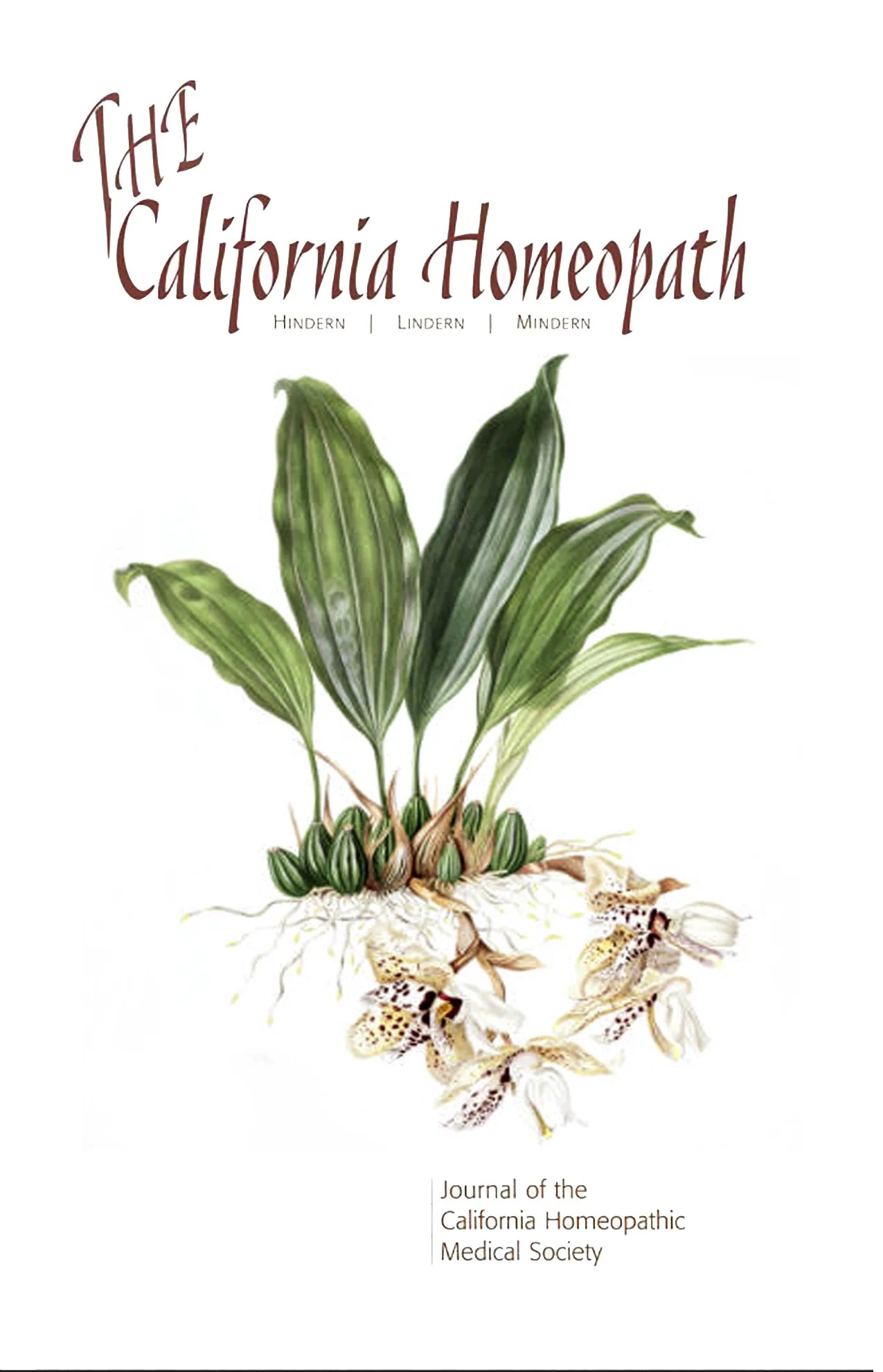
Editorial
by Richard Pitt
This is a reflective edition of the California Homeopath, looking at some people’s experience of practicing homeopathy in California, noting the changes in homeopathic work as the state changes and the social and political winds have their impact. In the last ten years, all the homeopathic schools in the Bay Area have closed but still many of the graduates of these schools are in practice and spreading homeopathy.

California’s Health Freedom Law, SB577 (2002)
by John Melnychuk, R.S. Hom. (N.A.)
On September 23, 2002, history was made in California. With the unanimous support of the legislature, Governor Davis signed into law SB-577 (2002), sponsored by the California Health Freedom Coalition (CHFC).
As of January 1, 2003, California law recognized the professional legitimacy of alternative and complementary health care practitioners and healers allowing them, for the first time, to be able to legally provide and advertise their services in California.
Governor Davis noted, SB-577 (2002) "will ease access to alternative and complementary health care options for all Californians." He also stated "the bill provides adequate safeguards for California consumers and enables them to make an informed choice regarding their personal health care."

Reflections on Homeopathic Practice
by Lisette Narragon
The author discusses the challenges of setting up and maintaining a homeopathic practice.

Reflections on a Homeopathic Life
by Avghi Constantinides
The author talks about her education, teaching and practice and gives valuable advice: “Whether you are a director of a school, a teacher or a practicing homeopath, make sure you have balance in your life. In the last 2-years many schools have closed, either from being poorly managed or overextending themselves. It's a tricky balance to find, but in the long run this does hurt our profession. If you do decide to practice homeopathy, please make sure you do it in a professional manner. It does make a difference to your patients and to your colleagues in the homeopathic community that you act in a professional manner always.”

The Homeopathic Profession is not for the Faint of Heart
by Edi Pfeiffer
When the author began her career as a homeopath, there was more of a momentum and enthusiasm with three well-established homeopathic colleges in the Bay Area and clinics in quite a few locations. But many in those groups were now aging and retiring and/or turning to CBD oil or regular medicine for their aches and pains! Now we're dealing with more of an atmosphere of corporate greed and the realization that homeopathic remedies are a big business. So our homeopaths and our pharmacies are having to deal with accusations and innuendos which the main stream media picks up.

Memorandum on California Senate Bill SB-577
by John Melnychuk
SB-577 states that its purpose is to facilitate access by Californians to alternative and complementary health practitioners who do not require medical training and credentials. It further finds that millions of Californians are presently utilizing these services, and that these “non-medical complementary and alternative services do not pose a known risk to the health and safety of California residents”. These recitations are important in understanding the approach established by SB-577 in allowing alternative and complementary health practitioners to legally function. SB-577 does not specifically authorize any particular form of healing arts practice. Instead, it recognizes that there are a wide variety of unlicensed healing arts practices and practitioners who can safely provide their services to the residents of California, without specifically identifying them.

To Study the Efficacy of Homoeopathy in the Management of Irritable Bowel Syndrome (IBS)
by Dr. Parth Aphale, MD (Hom.)
Irritable Bowel Syndrome (IBS) is defined as a gastrointestinal (GI) disorder characterized by altered bowel habits and abdominal pain in the absence of detectable structural abnormality. (Ref. Harrison)
IBS causes a great deal of discomfort and distress, but it does not permanently harm the intestines. Most people can control their symptoms with diet, stress management, and prescribed medications. For some people, however, IBS can be disabling. They may be unable to work, attend social events, or even travel short distances.
30 cases of IBS were studied satisfying the case definition. Observations with respect to age, sex, occupation and remedies were documented and the efficacy of homoeopathy was analyzed. The conclusion is that homoeopathy is useful in treating cases of IBS.
Keywords: IBS, Structural Abnormality, Homoeopathy, Intestines.
